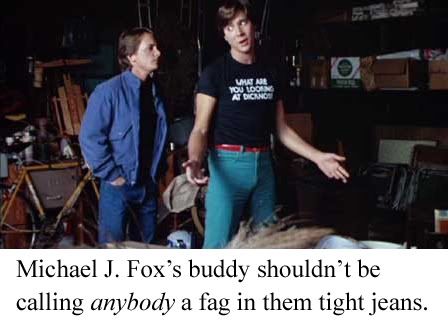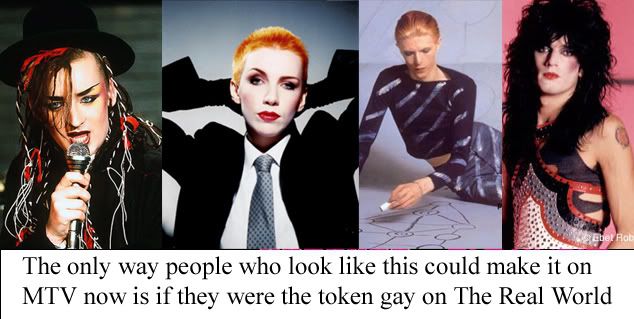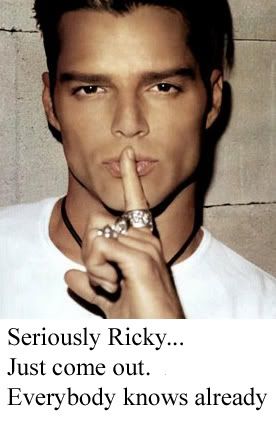In our culture, movies, television and music (and for some of us, comic books and video games as well) inform almost everything we know about our world. It’s logical that they should, then, inform everything we are supposed to know about ourselves and everything about how we are supposed to function with our peers. Don’t think so? We all like to think we are above it, but just look at your old high school yearbooks and see your horrible hair style and fashion choices, and then think about who was wearing the exact same thing on TV at the time. I’m more than sure that you’ll find a connection.
Growing up in the 80’s and 90’s, everything I knew about being gay came from popular culture. And needless to say, in the 80’s it was a serious assortment of mixed messages. On the negative side, there was movies and TV. If TV shows mentioned gay people at all, it was almost always as the butt of a joke on a stupid sitcom. In the cinematic world, the teen movie comedies were the worst offenders; technically I was no where near old enough to see them, but having HBO (and parents who worked late) took care of that particular problem. I distinctly remember two movies that came out the summer that I turned eleven: Teen Wolf starring Michael J. Fox, and Once Bitten, starring a then unknown Jim Carrey. In one scene in Teen Wolf, Michael J. Fox is trying desperately to find a way to tell his best friend that he is really a werewolf. His friend turns to him and says “You aren’t gonna tell me you’re a fag are you? Because I don’t think I can handle that” to which Michael J. Fox’s character responds “No, no…I’m not a fag….I’m a werewolf” Of course his friend accepts him, after all…he can’t help being a werewolf, but of course he has total say over whether he’s a fag or not. Right?

Then there was Once Bitten, a movie about a teenage virgin played by Jim Carrey, who gets seduced by a female vampire (Lauren Hutton) who needs virgin’s blood to stay young. In once scene, Jim Carrey’s buddies are trying to check his inner thigh for bite marks in the high school shower, and when it appears to the other showering jocks that some gay shit is going down, someone yells “Fags in the showers! Fag Alert! Fags in the showers!” and everyone runs out in a panic like someone yelled fire in a crowded theater. After the little debacle, one of Jim Carrey’s friends says “Oh my god… That means we liked it! That’s it. We’re homos! We’re rump-rangers!” As if being gay was something you could become if just enough other people called you it.
I remember almost nothing else about these movies, and have not seen them in decades. But my eleven year old brain absorbed those particular moments like a sponge, and it taught me that in this world, It’s okay if I end up being some kind of monster, but I had better not be a fag, because that would simply be unacceptable. It was like a warning to all gay kids: better go kill yourself now, or learn to hide your sexuality as well as you can, because life from high school on is going to be a living hell for you.
On the flip side of movies and television, though, there was the music world of the 80’s, as defined by MTV. For those of you reading this who are too young to remember, the M in MTV once stood for Music, and the whole appeal of MTV was that they played music videos 24/7 and not just reality shows about vapid rich kids. Boy George, long before he was imprisoning male escorts in his private dungeon, was a drag queen pop star who sold millions of records. Annie Lennox of the Eurythmics was all dyked out in a buzz cut and wearing a man’s business suit singing Sweet Dreams Are Made Of This. People like David Bowie were telling the world they were bisexual, even if they were really straight and were married to supermodels. Half the men in the music industry (be it pop or metal) wore make-up and had more hair product than your mom. The music biz was totally sissified. They couldn’t say they were gay, and in truth most of them weren’t, but the implication was there and it was enough. Sure, there was some backlash. Dire Straits had a huge hit song with Money For Nothing with lyrics that epitomized what regular straight-middle-America thought of all these homos selling millions of albums:
See the little faggot with the earring and the makeup?
Yeah buddy that’s his own hair
That little faggot got his own jet airplane
That little faggot he’s a millionaire

So I suppose as a little gay, in the closet kid, I had a choice to make; listen to the Hollywood movie making machine, who was telling me I was invisible or a pariah, or listen to the music world, which told me to embrace who I was and show off and be proud. I chose the latter, but I can hardly blame any kid who grew up hating themselves during this time, and are now in therapy as an adult as a result.
The irony was, by the time I actually was in high school in the 90’s, the entire paradigm would flip. Either because of the sympathy created by the AIDS epidemic, or simply because more and more gay people all over were coming out of the closet and being accepted, Hollywood began to change its tune. While we were still a long way off from lead characters being gay (much less showing gay intimacy on screen) it was no longer kosher to drop the word fag as a casual insult in film. Teen movies like Clueless had the cute guy in school that all the girls wanted to date end up being gay, as well as being accepted as part of the group. Hip shows like Melrose Place had gay characters as regulars, and MTV’s The Real World always had an LGBT cast member. Despite my feelings about MTV and reality television in general, I have to admit: The Real World did more to show the average American kid that gay people their own age were just like them than anything else in pop culture did up to that point. As for the geek media, well, we were all but non-existent there in the 90’s. There were three seperate Star Trek series in the 90’s, one which had an African American man as Captain and the other with a woman in charge, but none could find a spot for a single queer crewman. (We would have taken the Chekov role and not complained.) So much for diversity in the future. The world of comics was even worse. Unless it was a black and white indie book, good luck seeing very many visible gay or lesbians in comics at the time either.
And In the world of popular music, long gone were the days of gender bending superstars. The 90’s saw the ascendence of hip hop and pop punk as the dominating forms of music on the airwaves; where stars like Eminem could throw around the F Word and not only didn’t apologize for it, but seemed to revel in pissing off all those queers. Male musicians took and ultra masculine pose, and the women were more doey eyed and submissive and ditzy than ever before. The sound may have been 90’s, but the attitudes were straight out of the 50’s. There were exceptions to this rule, like queer-friendly bands like Green Day and Nirvana, but by the late 90’s the douchey Limp Bizkits of the world had taken over the charts.
Which brings us to the present. In this decade we’ve had more gay visibility in film and television than ever before, and the world of music seems slightly less homophobic than it did in the previous decade, if only slightly. Major hip hop stars like Kanye West have publicly spoken against the homophobia in hip hop culture, and pop punk stars like Pete Wentz of Fall Out Boy have gone on record several times about how he wishes he was gay and likes to kiss boys. Ten years ago that would have been the end of his career, now I imagine most of the kids who listen to that band shrug and say “so what?” (In the meantime Ricky Martin is STILL not out of the closet. Tick tock, Ricky, come one!) On TV, Ellen is a fixture, and Will & Grace was on for what seemed like twenty seasons.

So I can’t help but wonder what the gay kids of today are going to turn out to be like. They’ve got Brokeback Mountain in theaters, The L Word on TV, and the music world has Katy Perry telling everyone on the radio that she Kissed A Girl (Note to Katy: Jill Sobule Kissed A Girl ten years ago. If you wanted to one-up her your song should have been called “I Fucked A Girl” – just sayin’.) In many more ways than we ever had in the 80’s, popular culture is giving gay kids a more empowering message to be true to themselves and to be proud of who and what they are (at least at this particular moment in time). And when they happen to come upon Teen Wolf late at night on TNT, it will seem like a relic from an earlier, sillier, time and not a portent of doom about their futures.